 Petzlover
PetzloverScoland Terrier is originated from United Kingdom but Vikhan Sheepdog is originated from Pakistan. Scoland Terrier may grow 41 cm / 16 inches shorter than Vikhan Sheepdog. Scoland Terrier may weigh 37 kg / 81 pounds lesser than Vikhan Sheepdog. Scoland Terrier may live 8 years more than Vikhan Sheepdog. Both Scoland Terrier and Vikhan Sheepdog has almost same litter size. Both Scoland Terrier and Vikhan Sheepdog requires High Maintenance.
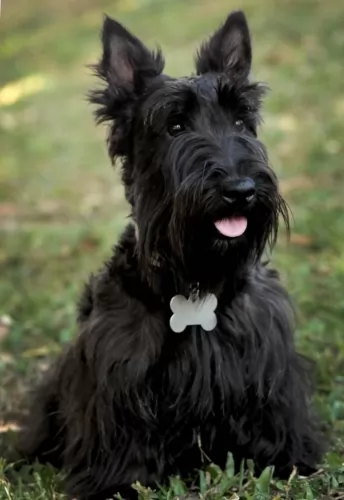 Not much is known about the Scoland Terrier. It is not a purebred but rather a crossbreed developed by crossing the Scottish Terrier with the Westland Terrier. To understand these mixed breeds, look to the original breeds for any combination of the characteristics of the breeds. The offspring of this crossing is not a 50-50 split of the original breeds looks or temperament.
Not much is known about the Scoland Terrier. It is not a purebred but rather a crossbreed developed by crossing the Scottish Terrier with the Westland Terrier. To understand these mixed breeds, look to the original breeds for any combination of the characteristics of the breeds. The offspring of this crossing is not a 50-50 split of the original breeds looks or temperament.
Because the Scoland Terrier is a mix between the Scottie and the Westie he has all the characteristics of a typical terrier perhaps even twice as much. With both parents being terriers, you can expect your Scoland to act like a short legged terrier. These dogs are known for their courage and tenacity. Today these terriers are family companions. Most terriers today come from a pool of ancestral dog in the 19th century in Europe. This information was gleaned from a genetic analysis done in 2006.
The Scoland Terrier, being a hybrid, is not acknowledged by the American Kennel Club (AKC) or the United Kennel Club (UKC). It is acknowledged by the International Designer Canine Registry (IDCR), American Canine Hybrid Club (ACHC), Dog Registry of America, Inc. (DRA), Designer Dogs Kennel Club (DDKC) and Designer Breed Registry (DBR).
The Vikhan Dog is a rare breed that very little is known about. It is not sanctioned by any breed club or kennel club. The breed originally came from Pakistan in the North-west Frontier Province near the Indian border, in the Chitral region and the state of Himacchal Pradesh. For the most part Pakistan is credited with the development of the breed. They originally guarded livestock and hunting leopard. He is fast and fierce. The breed is bonded to the livestock when they are very young and instinctually guard them for the rest of their life. They do not herd them, they blend into the flock and watch for outsiders.
They confront strangers and predators with aggressive displays and vocal intimidation. If this does not work, it will attack and drive them off. They are even known for luring coyotes into a trap with food so that they can hunt them.
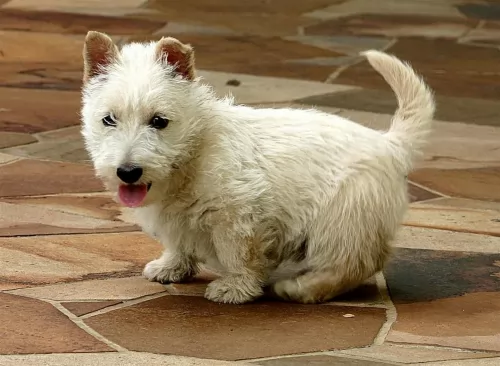 Being a hybrid, the Scoland Terrier will not always look alike and could look like a Scottie, a Westie or a combination of the two. Most breeders of this designer dog say it usually has a body like the Scottie and a round head like the Westie. They are more often black with white markings, but they can often be wheaten as well. With round dark eyes, a scissors bite and black nose, her face is unique. The breed has erect and small, triangular ears and a medium fluffy tale. The coat is hard and wiry, with a dense soft undercoat.
Being a hybrid, the Scoland Terrier will not always look alike and could look like a Scottie, a Westie or a combination of the two. Most breeders of this designer dog say it usually has a body like the Scottie and a round head like the Westie. They are more often black with white markings, but they can often be wheaten as well. With round dark eyes, a scissors bite and black nose, her face is unique. The breed has erect and small, triangular ears and a medium fluffy tale. The coat is hard and wiry, with a dense soft undercoat.
The Vikhan Sheepdog is a large working breed that is lean, muscular and aggressive. He is immensely intelligent and fearless. He has a thick coat in solid brown, red, fawn or black. There are also multi-colored and spotted versions as well. They are related to the other regional Molossers and are sometimes called the giant Rough Collie. They are faster than they are strong. All Molossers are solid, large and share the same ancestor.
They typically have short, muscular necks and broad but short muzzles. They have heavy bones, wrinkles and pendant ears. With well-muscled legs and wide chests, the Molossers include the mastiffs and bully breeds and all other breeds that come from those groups. Molossers are either flock guardians or home guardians. The Vikhan Sheepdog is a flock guardian
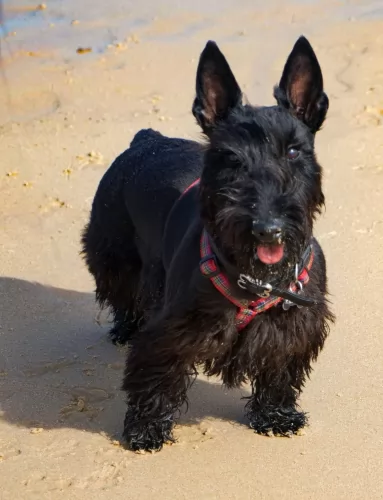 1.Children friendliness - they can be very good with children and children can help them get their exercise.
1.Children friendliness - they can be very good with children and children can help them get their exercise.
3.Adaptability - yes but she is adept at digging and must have a safe enclosure.
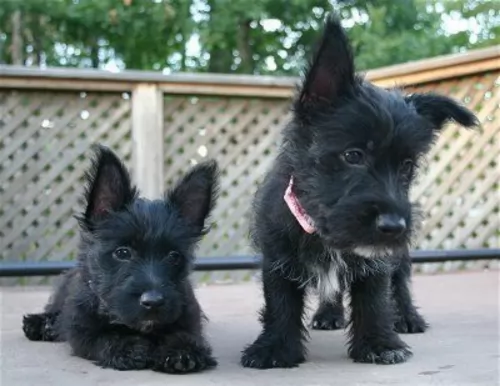 This hybrid dog can inherit any of the issues faced by its two parent breeds. For the Scoland Terrier this can include:
This hybrid dog can inherit any of the issues faced by its two parent breeds. For the Scoland Terrier this can include:
• Seborrhea – Skin disease that can cause dogs to scratch until bleeding and/or infected.
• Carniomandibular Osteopathy -called lion’s jaw this is a developmental disease that causes extensive changes in the bones of the mandible and skull.
• Pulmonic Stenosis – when the blood flowing from the heart’s right ventricul to the pulmonary artery is blocked.
• PPM or Persistent Pupillary Membranes - causes visual impairment when the membranes do not dissolve after birth.
• Chronic Hepatitis – disease of the liver that can eventually cause major damage.
Because this is a rare breed having lived in isolation for centuries, little is known or documented about their health issues. However being a large Molosser, they face some of the same health challenges as all large dogs. These include
• Bloat – when the internal organs of the intestinal system are knotted or inverted. Without immediate attention it causes death under all circumstances. You need to get the dog to a vet as soon as possible.
• Hip Dysplasia – Can cause lameness in hind legs and/or arthritis. Can be treated.
• Elbow Dysplasia – Can cause lameness in the front legs and/or arthritis. Can be treated.
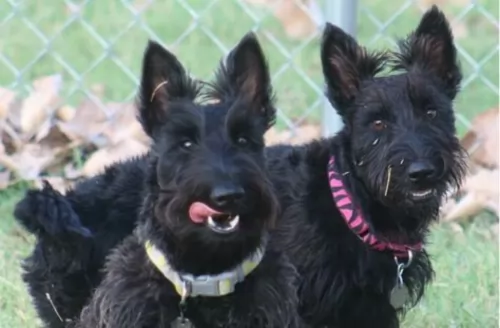 1.Feeding the puppy - Give a high quality puppy dog food designed for terriers or active medium sized dogs. Give ¾ of a cup over 3 meals a day.
1.Feeding the puppy - Give a high quality puppy dog food designed for terriers or active medium sized dogs. Give ¾ of a cup over 3 meals a day.
2.Feeding the adult – Give a high quality adult dog food designed for terriers or active medium sized dogs. Give one cup over two meals a day.
4. Games and Exercises – The Scoland Terrier is a very active dog and needs daily exercise, He need time to play, run, and be stimulated by games. She would be very good at flyball, Frisbee, fetch, agility, barn hunt, and obedience. He needs at least 2 hours of play and exercise everyday.
1Feeding the puppy – due to the risk of bloat, don’t overfeed and don’t feed large meals before or after exercise. Also don’t feed too high protein since the puppies grow so fast and it can cause bone injuries. Feed 3-4 x day.
2.Feeding the adult - due to the risk of bloat, don’t overfeed and don’t feed large meals before or after exercise. feed 2 X day
4. Games and Exercises Although large dogs they are surprisingly good at agility, they need a lot of exercise and long walks.